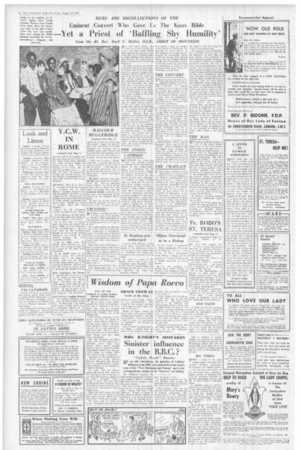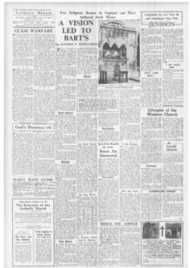Page 6, 30th August 1957
Page 6

Report an error
Noticed an error on this page?If you've noticed an error in this article please click here to report it.
Tags
Share
Related articles
Apostolic Blows By Mgr. Knox
Good Company Indeed
Suppdr4ac's Longest Engagement
The Confessions Of A Pre-conciliar Convert
Two Masters Of The Lost Art Of Friendship
Eminent Convert Who Gave Us The Knox Bible
Yet a Priest of 'Baffling Shy Humility'
ALL roads lead to Rome. But some do so more directly than others, and had young Ronald Knox enquired the way as he stood at the door of his childhood home he might well have been giden the Irish answer: " If I were going to Rome, I would not be for starting from here."
Ills father, however, the strongly Evangelical Bishop of Manchester, had joined with his Catholic neighbours in a vigorous struggle for the Christian schools, and it may be that in the divine logic there was some casual connection between this great-hearted action and the grace of conversion that came much later to one of his astonishingly gifted sons. Ronald's schoolboy brilliance. shown in the quality of his contributions to the magazine which he edited at Eton, was not a flash in the pan.
A first scholar of Band, he won both the Hertford Latin scholarship. the highest Oxford award of its kind for a man in his first or second year, and in the following year the Ireland scholarship, open for competition to all undergraduates. Between these two triumphs, and recorded with equal objectivity in his entry in Who's Who, he had sunk to a second class in Classical Moderations. I remember one of his examiners being twitted. long afterwards, on the absurdity of giving a "Second" to a Ronnie Knox ; he replied. doubtless with justice, that the award was entirely fair, as it was clear that Knox had not studied his prepared books. Two years later a "First" in Greats atoned for this lapse,, and it was followed by a fellowship at Trinity.
THE ANGLOCATHOLIC
'MEANWHILE the young man
had been evolving towards the position of the most advanced section of the Anglo-Catholic party. as represented by the S.S.P.P. with its motto: Loquere fails Israel ut proficiscantur—"Tell the children of Israel that they should become more advanced." The Oxford of those glittering years just before the 1914 war has given many eminent converts to the Church; one thinks of Vernon Johnson, Robin Laffan, Arnold Lunn. But it was also a home of theological liberalism, something no more congenial to this son of Bishop Knox than its earlier equivalent had been to another scion of Trinity, John Henry Newman.
Knox's reaction can be found both in the Drydenic satire Absolute and a Bit of Hell, a work of dazzling virtuosity, and in Some Loose Stones. a .prose answer to the liberal essayists of Foundations.
The trouble was that the foundations of advanced Anglo-Catholicism were also " loose." Mgr. Knox has told the story of his conversion, completed in 1917 by his reception into the Church, in his Spiritual Aeneid. Some, I suspect.
St. Maginus was submerged
A statue of' St. Maginus, patron of his native Tarragona and of sailors of the submarine service, has been dot in place under water in a submerged cave recently discovered on the Tarragona coast of Spain.
To install the statue of the Saint—who is said to have been beheaded under Diocletian about A.D. 304—the leaden image was lowered into the sea by the use of a pneumatic tyre, which was gradually deflated. have sensed a touch of insolence in this illusion to Virgil's epic. But assuredly for Knox himself the title suggested an obvious parallel between the providential destiny which led Aeneas from burning Troy to the seat of future Empire, and the hard and perilous journey of his own mind and spirit from the communion in which he had grown up to that greater Rome that is founded upon the Rock.
THE CONVERT
THE new convert was twenty-nine years old. Steeped in the dominant English tradition and in the wider tradition of classical humanism, a rebel from his youth up, it might have seemed that he would never find himself at home in the Catholic Church, culturally in exile since the Reformation, scholastic in its official thinking and authoritarian to the core. Such fears were unnecessary.
It is true that he never shook off the influences of Eton and Oxford; not so long ago he told me: "As one gets older one sheds so many prejudices; but I still think that Eton is better than Harrow, and Oxford than Cambridge "d-this with a glint of humour that robbed it of its edge. But below the scintillating satire, and the gay intellectual intolerance that was to ripen to a mellow charity as the years wore on, there was a deeper spirit, a spirit of profound religious devotion and of baffling shy hum ility.
He had come to learn how to be a child of Mother Church, and St. Edmund's, Ware. was to be his nursery. There he studied a little and taught more, learning no doubt the strange (to him) but most honourable and, in its own way, most English tradition of the recusants, and imparting in return some of that light that, except at Oxford, never was on sea or land.
THE CHAPLAIN
IT was a happy, perhaps a daring,
inspiration to send him back to Oxford in 1926 as Chaplain to the Catholic undergraduates (the masculine variety — Knox never wanted to be, what his successors have become, responsible for the Catholic alumnae of the women's colleges; later, he was to give ibe Creed " in slow motion " to the schoolgirls of Aldenham). It was at this period that I came across him first, in an Oxford Common Room, and it wgs a sign, perhaps, not only of my own Unperceptiveness but of his unfathomable capacity for self-effacement, that I was not impressed.
It certainly had no other significance, since Ronald Knox was for years the great "draw" of the Oxford Union Eights Week debate, where his flashing brilliance of phrase and wit and fancy eaptivated an audience impatient of the second-best. The chaplaincy period was also that of the detective stories, written to make money for
Oblate Provincial to be a Bishop
The Holy Father has appointed Fr. Albert Sanschagrin, Provincial of the Montreal Province of the Oblates of Mary Immaculate, titular Bishop of Bagis and Coadjutor with the right of succession to Bishop Desmarais of Amos, Quebec.
He has also appointed Fr. Alfred Atton titular Bishop of Theudalis and Auxiliary to Bishop de la Vacquerie of Orleans, France. the chapel at the Old Palace for which he was responsible.
His sermons to the undergraduates, continued after he gave up the chaplaincy in 1939, have in some measure been preserved in books which are a model of instruction perfectly adapted to a highly specialised audience. He was in fact an outstanding exponent of the modern short sermon as an artform, and has for many years been in great demand both for weddings and for major ecclesiastical occasions. His gifts as a preacher were used at a deeper level in his retreat addresses, some of which have been publitthed; while a long series of miniature sermons in the Sunday press has familarised a wider public both with his skill and with that profound piety which was so carefully concealed in social intercourse; and yet sp evident to those who knew him best.
Of his serious scholarly work space forbids any adequate appraisal here, but mention must be made of Enthusiasm; his translation of the Bible (all his profits from this were handed over to the Hierarchy); and his recent commentaries on the New Testament. It may be that the translation of the Bible will be the work by which above all he will live, and it was to deliver his Romanes lecture on the subject of translation that he travelled to Oxford recently, when already a very sick man.
THE MAN
MUCI1 more could and should be said of his varied literary achievement, as also of his broadcasting work in the early days of that medium of communication — together with Fr. Martindale be was one of the outstanding pioneer Catholic broadcasters. But what of the man himself? I think the verdict of his friends (and who, that knew him, but was proud to claim that title?) will be, first, that the mask of gaiety covered a ternperament naturally sad, easily touched by the sorrows of 'humanity and poignantly aware of the gap between human possibilities and human achievement; secondly, that gaiety and sadness alike were transfigured by the grace which, in bringing him to the feet of the Church, had thereby brought him to an ever deepening intimacy with Christ. who has called us not his servants but his friends.
He became a Domestic Prelate in 1936 and a Protonotary Apostolic in 1951.
Last year he had the unique distinction of being appointed to the recently revived Pontifical Roman Academy of Theology, whose membership is limited to 40, only 10 being chosen from residents outside Italy.
blog comments powered by Disqus







